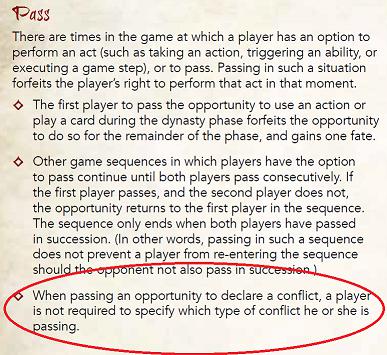Most people I play against will often just say "pass my conflict" when they choose to pass a conflict, which is not how I interpreted the rules regarding passing conflicts. I haven't brought it up because it seems up to interpretation (not to mention it feels like sort of an obscure and non-intuitive rule), but I'd like to know where the community falls on the issue.
In page 20 of the RR it outlines how conflicts are declared, as seen below, and it gives you the option to pick one of two things. Either you can declare military or pass military, or you can declare political or pass political. Now, to me this indicates that those options are discrete. You must pick one and it must be known to both players which was chosen, and the player that passed is subsequently locked out of the conflict type they passed. However, everyone I've played against doesn't follow this line of thinking. What do you think? Should you declare which conflict type you pass, or is it left open?
Edited by player2636234.jpg.0dac9be9c2c8eed65726f40b2f385ede.jpg)
